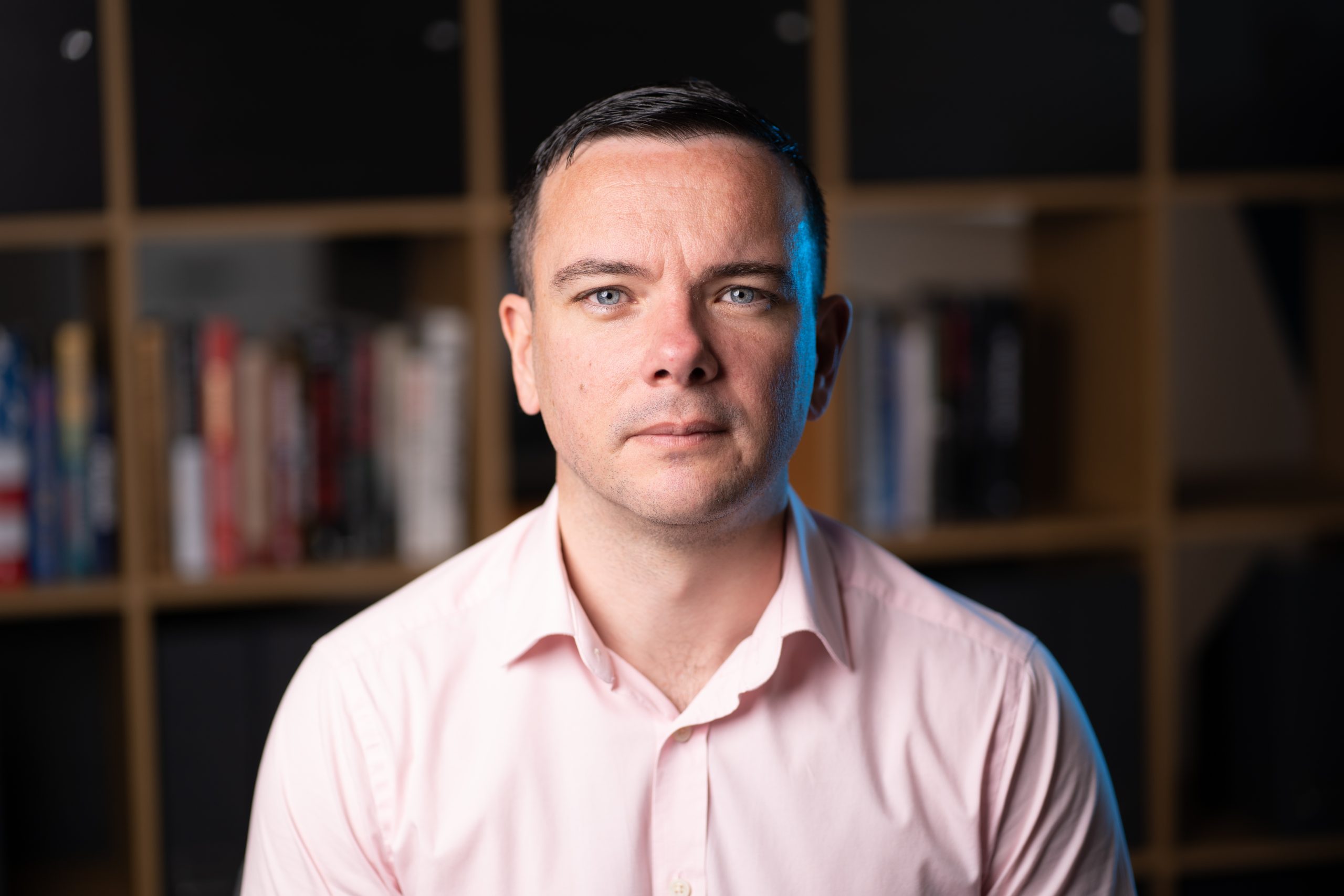Bombings, Bullets and Begging: Organised Crime in Sweden
Since Intelligence Fusion began monitoring Sweden in 2016, we’ve noticed a general escalation in significant violence centred around organised criminality within the country.
Although primarily centred in the major urban cities of Stockholm, Malmö and Gothenburg, one of the trends witnessed is the spreading of gang conflict and violence to provisional urban areas such as Helsingborg, Uppsala, Linköping and Västerås. Once confined to poorer and ethnically diverse neighbourhoods of major cities that have been labelled as “vulnerable” areas by the Swedish government, violence is now being reported in more affluent localities previously unaffected.
The perceived deterioration of the domestic security situation and crime in Sweden has led to the issue taking prominence in political debate with parties such as the Sweden Democrats and Moderate Party accusing the incumbent government under Stefan Löfven of ineptitude and incompetence.
The Sweden Democrats leader Jimmie Åkesson has even called for the dismissal of Justice Minister Morgan Johansson over failing to address the issue. Even respected Swedish political commentator Mats Knutson has stated that if the government fails to adequately tackle crime, Stefan Löfven’s position will be threatened. Police forces, having had previously to deal with budget cuts, are now under increasing political pressure. Indeed a recent shooting of a teenage boy aged 15 in Malmö has led to the initiation of a special national taskforce specifically to counter the problem of gang crime.
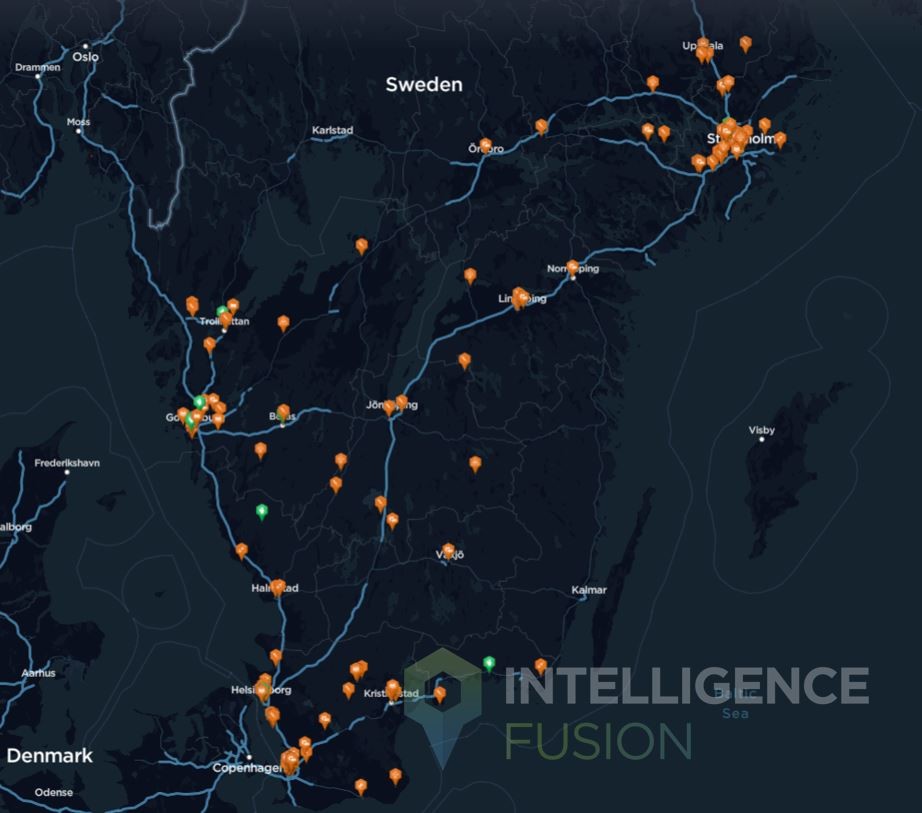
Snapshot of explosive related incidents in Sweden in 2019. Source: Intelligence Fusion 2.0.
Explosions
Up until the 11th November, Intelligence Fusion recorded over 160 explosive related incidents in 2019. In the whole of 2018, 162 explosions were reportedly recorded across Sweden.
Our threat intelligence platform differentiates by the explosive used and categorises each incident to accurately reflect the type of ordnance being used by criminal gangs in Sweden.
Throughout 2017 and 2018, the majority of devices used were powerful firecrackers such as Cobra-8 or ex-Yugoslavian M75 hand grenades. However since the late autumn of 2018 and going into 2019, one increasingly concerning trend identified was the increase in the manufacturing and usage of home made IED devices.
Initially being used predominantly in Skåne, IEDs containing more powerful yields and destructive power, have over the past 12 months, migrated wider throughout Sweden. As an example of the size and power of these IEDs, a blast that damaged multiple apartments in Linkoping, in early June 2019 was found to be caused by a device containing at least 15 kilograms of explosives. In Lund, a woman passing on a bicycle was also seriously injured by an explosive device detonating against a property in September 2019.
Malmö has witnessed the highest concentration of detonations. Historically many incidents of explosives previously reported in the city in 2017 or 2018 occured in areas such as Rosengård or Fosie. Currently a significant number of incidents have now migrated to more central and affluent areas such as Gamla Staden with businesses such as restaurants, nightclubs and convenience stores being targeted with more powerful devices. In a previous report from Intelligence Fusion, dated April 2019, we stated in relation to Malmö:
“In 2018, we recorded 38 incidents related to explosive devices being detonated in the city although the majority were firecrackers or sound bombs such as Cobra 8 devices designed to deter and intimidate rather than cause large scale destruction. The concerning trend for 2019, is that although devices are fewer in number they appear to have increased in lethality.”
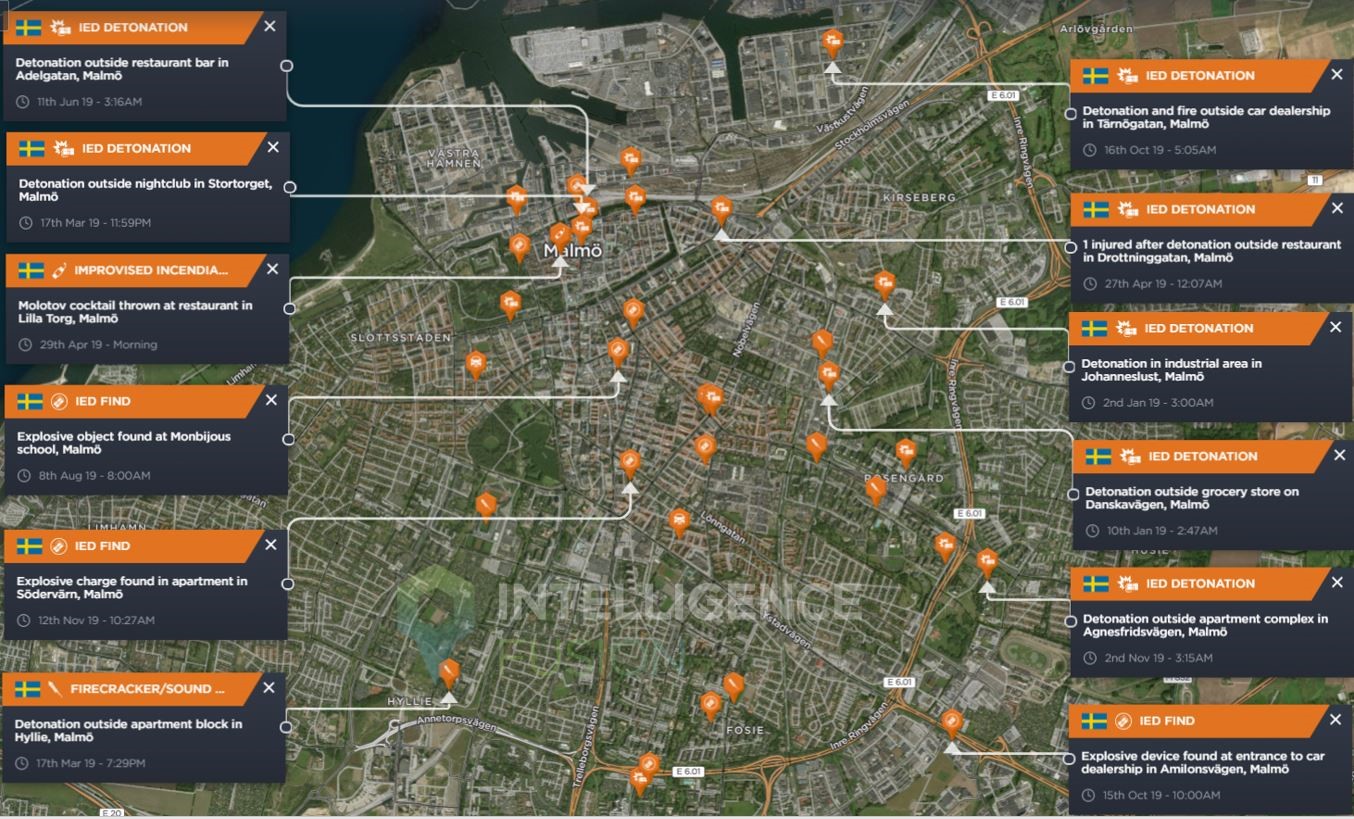
Explosives related incidents in Malmö 2019. Source: Intelligence Fusion 2.0.
Since the timing of that report, devices not only have become more powerful but have increased in frequency. According to our data, nearly 50 percent of national explosive incidents were recorded in Skåne County in cities such as Helsingborg, Kristianstad and Malmö. Comparatively, Stockholm and Gothenburg have witnessed less incidents.
The below image shows a snapshot from Intelligence Fusion’s platform comparing explosives related incidents in four cities in 2019. Gothenburg Police Chief, Erik Nord, has led actions against organised crime in the region working with local businesses to try to prevent acts of intimidation or extortion. This has worked to reduce shootings in the locality in 2019 compared to 2018 and has likely also reduced explosive incidents.
Stockholm, under the leadership of Police Chief Ulf Johansson, has also attempted to use similar methods such as increasing cooperation with municipalities. A high profile death of a commuter who picked up and accidentally detonated a hand grenade outside the Varby Gard subway station in Huddinge in January 2018 has led to increased efforts by Stockholm police to arrest weapons manufacturers or distributors targeting areas such as Husby in police raids and increasing the proliferation of surveillance cameras.
Helsingborg, a comparatively minor town compared to the three major cities of Stockholm, Gothenburg and Malmö, has witnessed the fourth highest concentration of explosive incidents nationally.
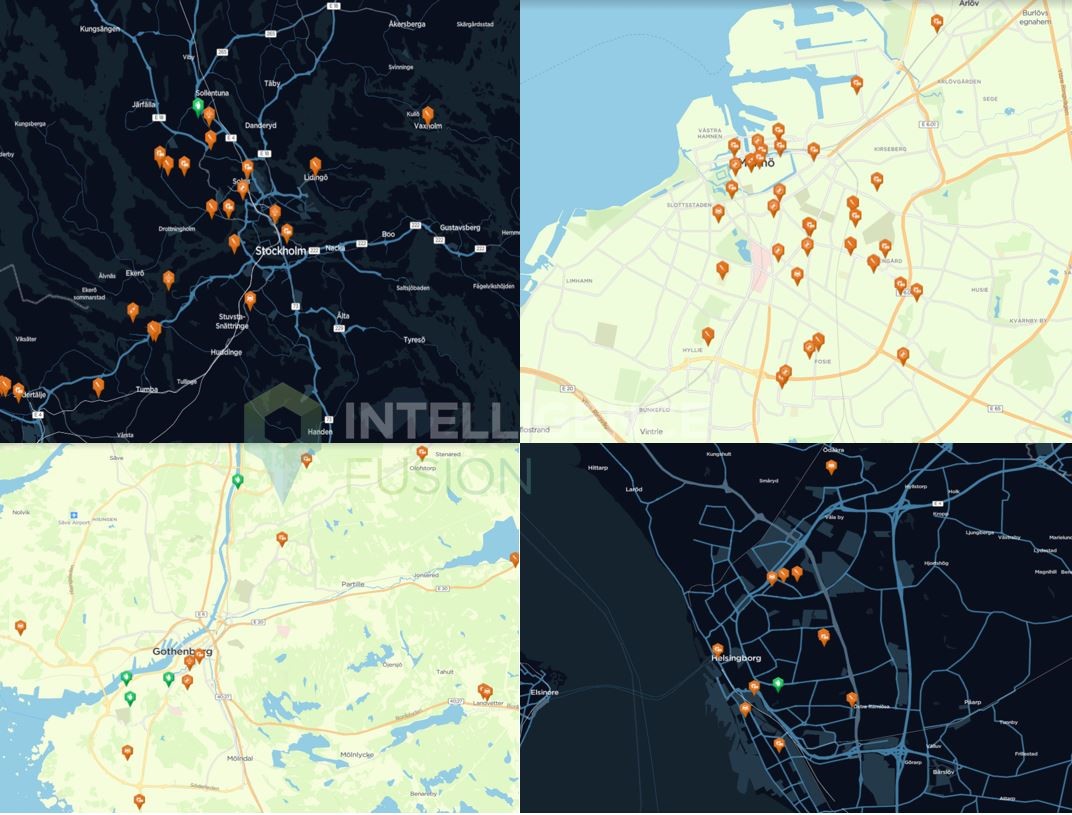
Explosives related incidents in Stockholm, Malmö, Gothenburg and Helsingborg 2019. Source: Intelligence Fusion
Criminal Groups
The sheer number of organised crime groups and the multitude of operations that they run is also a significant challenge to police. A report from the Stockholm Police Intelligence Unit (Polismyndigheten) stated that approximately 50 gangs are operating in Stockholm alone in 2018 consisting of around 1,500 members. Gang’s criminal enterprises run from organised begging operations, drug trafficking to prostititution and people smuggling.
The arrival of new gangs from different ethnic groups has also led to more challenges. Gangs such as the “Black Ax” Nigerian mafia group have newly established themselves and are challenging other groups. Conflict between groups, generally centred around ethnic or cultural lines, will only escalate as groups become increasingly willing to use more violent tactics and methods. These gangs recruit from extended family, clans or even in Mosques, making it difficult for police to make intelligence gains.
Another effect of the increased police focus on organised crime has been that it has drawn police resources away from routine criminal policing. This has led to an increase in lower level crimes such as muggings or burglaries. For example, Gothenburg’s success in cracking down on violent crime has led to an increase in armed robberies of individuals as well as knife crime on the streets, especially overnight.
Arson attacks on vehicles, almost routine in some urban areas of Sweden, have also continued. Having tracked this trend on our platform since 2017 we can identify concentrations of incidents, using our heat mapping tool, as well as other details such as the timing of attacks.
Over the past few months in Lund, a series of arson attacks have occurred on vehicles challenging the local police authority and causing concern in the wider community. This arson trend has also spread to schools and municipal buildings in some areas of Sweden – a trend we have also followed in France. With police diverted away from routine patrolling, private security will be increasingly relied on to assist the police in deterring and identifying any criminal activity in neighbourhoods.
International Relations
The perceived crime wave in southern Sweden has now also caused concerns for Sweden’s neighbours. Denmark temporarily reinstated checks at its border crossings with Sweden after a series of bombings and shootings in the Copenhagen area that authorities allege were carried out by members of Swedish organised gangs. Although having a long standing problem with biker gang organised crime that has been monitored by Intelligence Fusion, Danish authorities have stated that a new wave in violence stems directly from gangs operating in Skåne County. Lene Frank of the Danish national police said: “We are targeting organised crime and aim for normal travellers to be affected as little as possible by the border control. Officers will be focused on cross-border crime involving explosives, weapons and drugs.” Actions like this, only serve to embarrass the Swedish government and put further pressure on politicians to act.
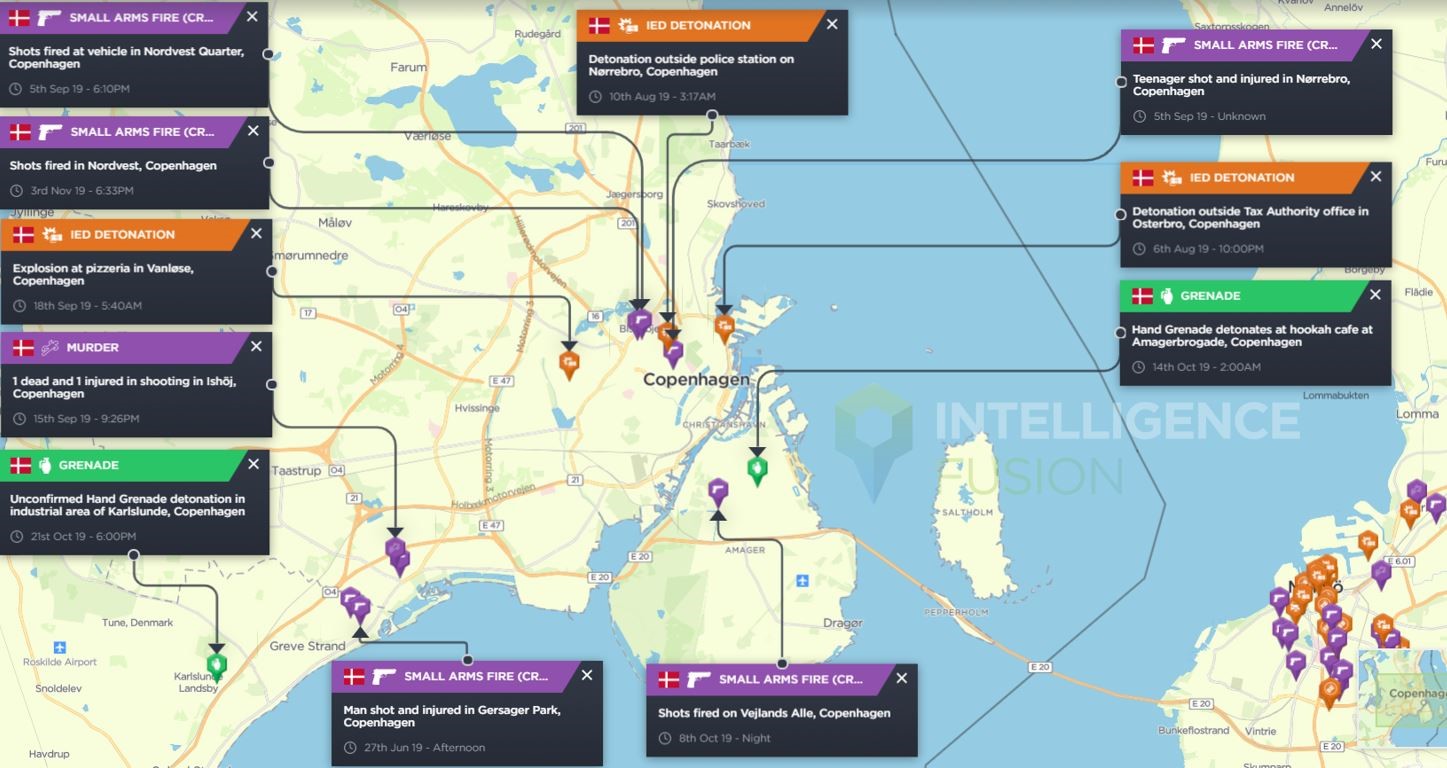
Snapshot of violent crime in Copenhagen since June 2019. Source: Intelligence Fusion 2.0.
A Way Ahead?
Politicians are now looking for answers and have pledged to recruit and train additional police officers. However, that process will likely take at least five years before satisfactory levels of training and experience in officer numbers are reached.
In the meantime, politicians must listen to senior police leaders such as Erik Nord who have been calling for extra police resources in technology, advocating for increased use of surveillance cameras to confront street crime and clamping down on catch-and-release policies that have only emboldened youth criminals potentially leading some down an increasing path of violence and careers in organised crime groups.
With minimal resources and less money devoted to community engagement and physical patrolling, police will need to increasingly look to private security organisations to assist in security matters and intelligence led policing in Swedish cities. Private security companies will, in the short to medium term at least, be able to provide routine assistance in physically guarding properties or patrolling in neighbourhoods and information sharing to police.
Intelligence Fusion has gathered over 9,000 incidents across Sweden since the beginning of 2016 when we first identified the trend and increasing pattern of violent crime within the country.
We track over 100 categories of crime as well as social and political unrest. If your business requires an comprehensive picture of the global threat landscape in Sweden, or globally, talk to Intelligence Fusion about why we’re the intelligence provider of intelligence providers.
